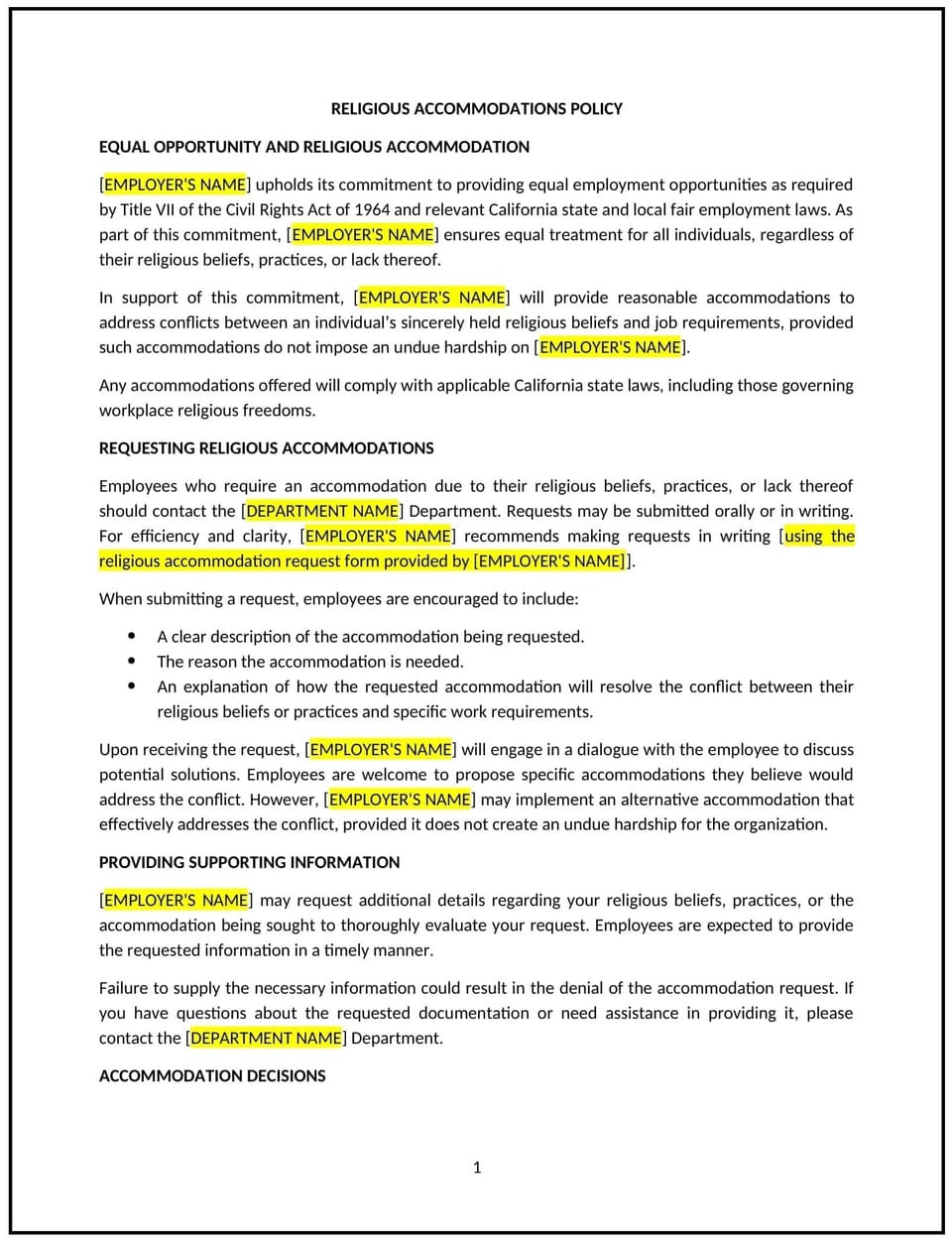Religious accommodations policy (California): Fee templat

Religious accommodations policy (California)
In California, a religious accommodations policy provides businesses with guidelines for addressing and fulfilling employees’ requests for accommodations based on their religious beliefs or practices. This policy supports compliance with the California Fair Employment and Housing Act (FEHA) and Title VII of the Civil Rights Act, which require employers to provide reasonable accommodations for religious practices unless it poses an undue hardship on the business.
This policy outlines procedures for requesting accommodations, evaluating requests, and implementing adjustments to ensure an inclusive and respectful workplace.
How to use this religious accommodations policy (California)
- Define accommodations: Specify the types of religious accommodations that may be requested, such as schedule adjustments, dress code exemptions, or prayer space provisions.
- Communicate employee rights: Ensure employees understand their rights under California law to request reasonable accommodations for religious practices.
- Outline request procedures: Provide clear steps for employees to submit accommodation requests, including required documentation or forms.
- Evaluate requests: Establish a process for assessing requests, considering the reasonableness of the accommodation and its impact on business operations.
- Document decisions: Maintain records of accommodation requests, evaluations, and outcomes to ensure transparency and legal compliance.
Benefits of using this religious accommodations policy (California)
This policy offers several advantages for California businesses:
- Supports compliance: Reflects California labor laws and federal requirements to provide reasonable religious accommodations.
- Promotes inclusivity: Fosters a workplace culture that respects and values employees’ religious beliefs and practices.
- Reduces conflicts: Provides clear guidelines for managing religious accommodations and addressing related concerns.
- Enhances employee satisfaction: Demonstrates the business’s commitment to supporting diversity and inclusivity.
- Minimizes risks: Mitigates potential legal disputes by adhering to lawful procedures for religious accommodations.
Tips for using this religious accommodations policy (California)
- Reflect California-specific laws: Ensure compliance with FEHA and related state regulations on religious accommodations.
- Train managers: Provide guidance on recognizing and addressing accommodation requests lawfully and respectfully.
- Encourage open communication: Foster an environment where employees feel comfortable discussing their accommodation needs.
- Balance accommodations: Ensure that adjustments are reasonable and do not pose undue hardship on business operations.
- Review regularly: Update the policy to reflect changes in California laws or workplace practices.
Q: How does this policy benefit the business?
A: This policy supports compliance with California labor laws, promotes workplace inclusivity, and ensures fair handling of religious accommodation requests.
Q: What types of accommodations can employees request under this policy?
A: Employees may request accommodations such as flexible schedules, dress code modifications, or space for religious observances, as outlined in the policy.
Q: How does this policy support compliance with California laws?
A: The policy reflects FEHA and federal regulations, ensuring lawful and consistent handling of religious accommodation requests.
Q: What steps should employees take to request a religious accommodation?
A: Employees should notify HR or their manager, provide details about their needs, and submit any required documentation to support their request.
Q: How can the business evaluate accommodation requests?
A: The business can assess the reasonableness of the request, consider operational impacts, and implement adjustments that do not create undue hardship.
This article contains general legal information and does not contain legal advice. Cobrief is not a law firm or a substitute for an attorney or law firm. The law is complex and changes often. For legal advice, please ask a lawyer.


